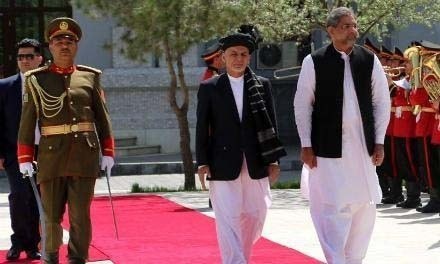ISLAMABAD: With their new bilateral engagement framework — Afghanistan-Pakistan Action Plan for Peace and Solidarity (APAPPS) — in place, senior officials of Pakistan and Afghanistan pledged to make a fresh start in their relations that have mostly remained tense.
Afghan Deputy Foreign Minister Hekmat Khalil Karzai and Pakistan’s National Security Adviser retired Lt Gen Nasser Khan Janjua during their meeting agreed to intensify efforts for success of APAPPS and “take a fresh start, bridge existing gaps, build formal mechanism of cooperation in all areas of mutual interests and take collective actions to strengthen trust between the two countries”.
Take a look: Pakistan, Taliban have legitimate grievances: US
APAPPS became operational with the meeting of Afghan deputy FM Karzai and Pakistan’s Foreign Secretary Tehmina Janjua in Islamabad on Monday. Prime Minister Shahid Khaqan Abbasi and President Ashraf Ghani last month endorsed the new engagement mechanism and tasked their foreign ministers and national security officers to finalise it.
APAPPS would have six working groups including those on security and intelligence — the two issues at the core of the troubles in Pak-Afghan ties.
Senior officials of two countries agree to intensify efforts for success of APAPPS
The new framework is based on a set of seven principles, which include commitments that Pakistan would support the Afghan-led and Afghan-owned peace and reconciliation; the two countries would undertake effective actions against fugitives and the irreconcilable elements posing security threats to either of the two countries; both countries would deny use of their respective territory by any country, network, group or individuals for anti-state activities against either country; they would put in place a joint supervision, coordination and confirmation mechanism through liaison officers for realisation of the agreed actions; territorial and aerial violations of each other’s territory would be avoided; there would be no public blame game and instead APAPPS cooperation mechanisms would be utilised to respond to mutual issues of contention and concerns; and working groups and necessary cooperation mechanism would be set up as per APAPPS.
Gen Janjua told Mr Karzai that APAPPS would be instrumental in bringing both sides closer.
Mr Hekmat also expressed the hope that APAPPS would make bilateral cooperation sustainable and would “cover the gaps” in the relationship.
He believed that both countries would have to reverse the challenges in the ties together. Gen Janjua and Mr Karzai agreed that the two countries should separate economics from politics and economic cooperation should be given a chance to surpass political impediments.
Published in Dawn, May 16th, 2018















































